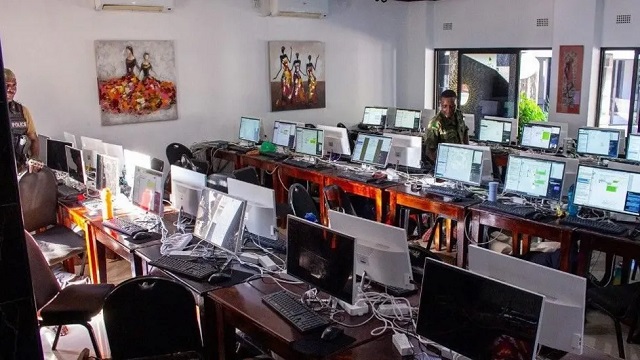
Lengthy jail terms have been handed to 22 Chinese citizens – and a Cameroonian man – for cyber-related crimes in Zambia.
The gang’s only female convict, Gu Tianjiao, reportedly cried “papa, papa” as her seven-year sentenced was announced in the Lusaka Magistrates Court on Friday.
Some in the gang – including its mastermind Li Xianlin – received up to 11 years in prison.
The group’s members were also fined between $1,500 and $3,000 (£1,180 and £2,360) each.
Victims as far afield as Singapore, Peru and the United Arab Emirates fell prey to their online scams, say Zambian authorities.
After a trial lasting several weeks, the perpetrators pleaded guilty on three charges – computer-related misrepresentation, identity-related crimes, and illegally operating a network or service.
The 22 people jailed on Friday were among a bigger group of 77 suspects arrested in April, in connection with what authorities called a “sophisticated internet fraud syndicate”.
The swoop on a Chinese-run company in the capital, Lusaka, followed an alarming rise in internet fraud cases in the country, targeting people in countries around the world.
Growing numbers of Zambians losing money from their mobile and bank accounts through money-laundering schemes which extend to other foreign countries, the Drug Enforcement Commission (DEC) said in April.
Dozens of young Zambians were also arrested after allegedly being recruited to be call-centre agents in the fraudulent activities, including internet fraud and online scams, the DEC said during the arrests.
The 22 people convicted in Lusaka on Friday held different positions in the Chinese-run Golden Top Support Services, the company at the centre of the raid.
The company, located in Roma, an upmarket suburb of Lusaka, is yet to comment on the allegations.
The Zambian nationals were charged in April and released on bail so they could help the authorities with their investigations.
Authorities said the Zambians involved had been tasked “with engaging in deceptive conversations with unsuspecting mobile users across various platforms such as WhatsApp, Telegram, chatrooms and others, using scripted dialogues”.
Among equipment seized were devices allowing callers to disguise their location and thousands of Sim cards.
During the raid, 11 Sim boxes were discovered – these are devices that can route calls across genuine phone networks.
More than 13,000 Sim cards, both local and foreign, were also confiscated, demonstrating “the extent of the operation’s reach,” according to the DEC.
Two firearms and about 78 rounds of ammunition were confiscated and two vehicles, belonging to a Chinese national linked to the business, were also impounded during the raid.
Source: bbc.co.uk






Be the first to comment